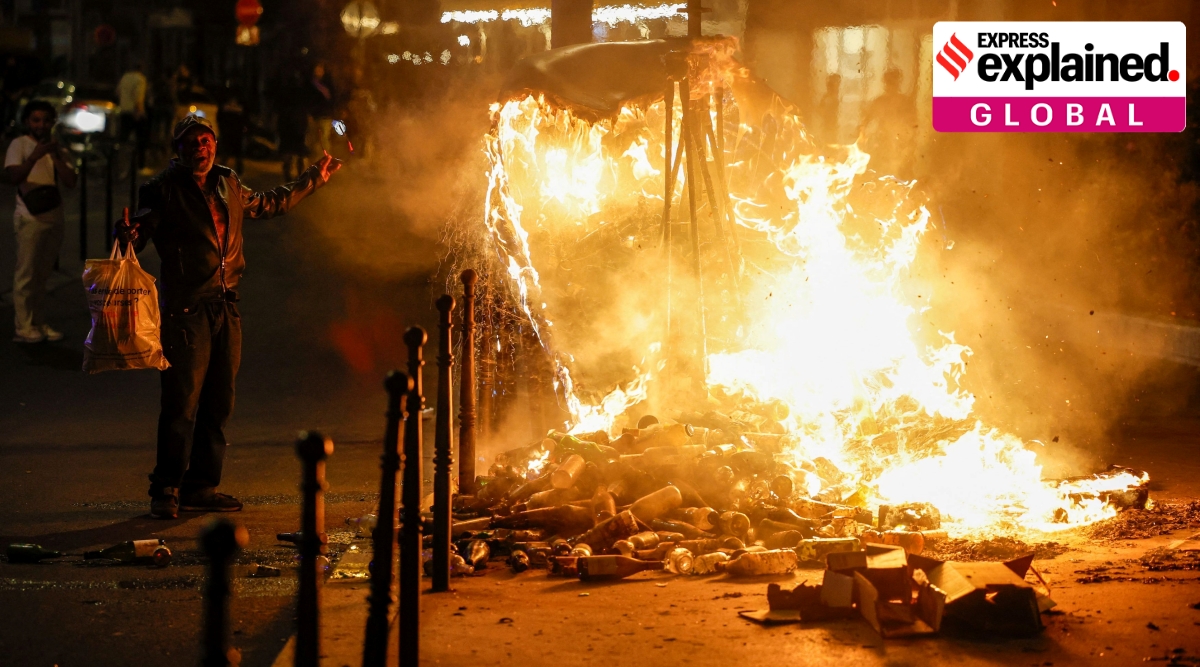Why has France been engulfed by protests – again?
The latest protests erupted after Nahel, a boy of Algerian descent, was shot dead by the French police for allegedly not having a driver’s license. French President Emmanuel Macron has appealed for calm amid heavy police deployment.
 A man gestures next to a burning container as people protest following the death of Nahel, a 17-year-old teenager killed by a French police officer in Nanterre during a traffic stop, and against police violence, in Paris, France, June 30, 2023. (Photo: REUTERS/Juan Medina)
A man gestures next to a burning container as people protest following the death of Nahel, a 17-year-old teenager killed by a French police officer in Nanterre during a traffic stop, and against police violence, in Paris, France, June 30, 2023. (Photo: REUTERS/Juan Medina) A few months after it witnessed massive protests over pension reforms, France is on the boil again. Over the last week, protests have swept across France following the death of a teenager as a result of the excessive use of force by the police on Tuesday (June 27).
Cars and public buildings were set on fire and clashes were reported between police and protestors, who have taken to the streets to rally against French authorities’ excesses. On Sunday, a burning car struck the home of the mayor of the Paris suburb of L’Hay-les-Roses.
However, a week after the shooting that sparked off the protests, things are calmer than they were, initially, with fewer arrests by police. On Saturday, 719 arrests had been made, and so far over 3,000 people have been detained, with around 45,000 police personnel deployed on the streets.
The grandmother of the French teenager has asked for the violence to stop, saying she was angry at the officer who killed her grandson but not at the police in general and expressed faith in the justice system.
President Macaron also cancelled his scheduled official visit to Germany in light of the protests. He will meet the mayors of around 220 towns affected by the violence. Macron also wants to start a detailed, longer-term assessment of the reasons that led to the unrest, an official told AP.
What is happening in France?
Large-scale protests were first reported in suburban Paris and then spread to a few other cities in France.
These were triggered by the death of 17-year-old Nahel. Nahel was a resident of Nanterre, a suburb to the west of Paris. He was allegedly driving a car without a license around the city when two policemen stopped him.
According to the Le Monde, the yellow Mercedes car and its young driver came to the notice of the policemen. They asked the driver to stop the vehicle at a traffic light, but the driver ran the red light. Two passengers were accompanying him in the car.
The car then stopped at the side of a road. According to a video that has been circulating widely after the death of Nahel, at least one of the policemen had their gun aimed at the car while they were talking. After the vehicle drove away from the officials against their orders, a bullet was fired at the boy, killing him, and the car then drove into a roadside pavement. The other passengers fled the scene.
Belonging to a French-Algerian family, Nahel was an only child of a single mother. He was enrolled in a course to become an electrician, as part of a larger programme to upskill and assist young people from disadvantaged areas. His attendance at the college was poor and he played rugby, a BBC report said, adding he did not have a police record.
What has the scale of protests been like?
Clashes between the police and protestors erupted on Tuesday night in and around Nanterre, and the government deployed 2,000 police personnel, AP reported.
 Protests have continued in France despite a strong police crackdown. (Photo: REUTERS/Yves Herman)
Protests have continued in France despite a strong police crackdown. (Photo: REUTERS/Yves Herman)
Soon, however, the protests spread across France, with long-existing undertones of racism in society and the disproportionate use of force by the police at the centre of public anger.
“It’s an explosion of general anger” directed not just at police oppression, but also at economic and racial inequities, Mathieu Rigouste, the author of La Domination Policière, a book examining how French policing practices are rooted in colonialism, told Vox. He added: “In spite of international criticism and local struggles, the French state has continually reinforced its police, prisons, and borders (multiplying weapons, laws, and units specialized in ferocity) as well as judicial impunity over the last 30 years”.
Nahel’s mother has taken part in marches protesting the police action. She said the policemen “saw an Arab face, a little kid, and wanted to take his life” but told France 5 TV that she blamed only the one person who fired the shot, not the police.
Nanterre’s public prosecutor Pascal Prache, in a public statement, said that an autopsy showed that Nahel was killed by a single bullet. A formal investigation of the officer, under the charge of voluntary homicide, has been initiated. “The prosecution considers that the legal conditions for the use of the weapon” by the police officer who fired the shot “are not met”, Prache said.
Rallies have continued despite numerous arrests as well as the generous use of teargas by the police. Over the first two days, the police arrested about 150 people around the country, more than half from Paris. Later in the week, many cities witnessed looting and arson. The facade of the Paris aquatic centre, where Olympic swimming events will be held in 2024, was damaged.
What has President Macron said?
French President Emmanuel Macron has appealed for calm and termed the death of Nahel as “unforgivable and inexplicable”. He has also said that “Violence against police stations, schools, town halls, against the Republic, is unjustifiable”, in a tweet. On Friday, he said he would ask social media companies to take down inflammatory messages, “sensitive” footage of rioting and ask for those spreading such messages to be identified.
The government has held meetings on taking steps for calming the situation. Emergency was last imposed following weeks of rioting in France in 2005, when two boys fleeing police, in an attempt to hide, got electrocuted in a power substation. Concerns have been raised over a possible repetition of that time when thousands were arrested amid protests.
(With inputs from AP)
- 01
- 02
- 03
- 04
- 05






































